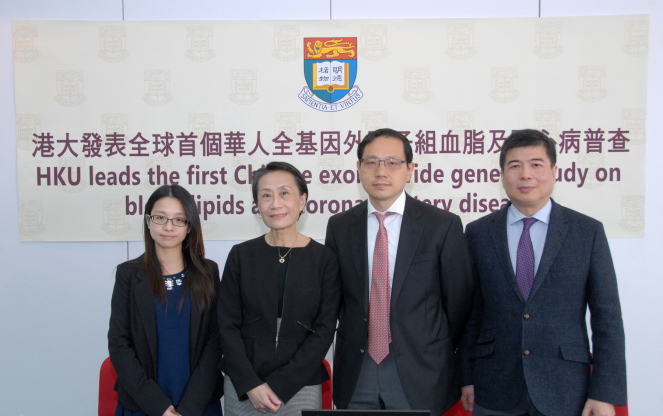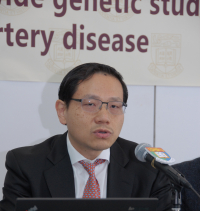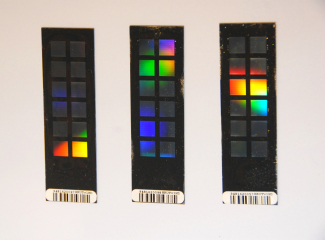Media
HKU leads the first Chinese exome-wide genetic study on blood lipids and coronary artery disease
23 Dec 2015

The research team took a group photo at the press conference. (From left) Dr Clara Tang Sze-man, Research Assistant Professor, Department of Surgery, Professor Karen Lam Siu-ling, Rosie T T Young Professor in Endocrinology and Metabolism, Chair Professor and Head of Department of Medicine, Professor Tse Hung-fat, William M W Mong Professor in Cardiology, Chair Professor of Department of Medicine, and Professor Sham Pak-chung, Chair Professor of Psychiatric Genomics and Director of Centre for Genomic Sciences, Li Ka Shing Faculty of Medicine, HKU.
The research team at the Li Ka Shing Faculty of Medicine, The University of Hong Kong (HKU), in collaboration with researchers from the Joint Institute of the Peking University Health Science Center and the University of Michigan Medical School study of Myocardial Infarction (PUUMA-MI), found several genes in Chinese are associated with blood lipid levels for the first time, which will help assessing the risk of Chinese developing coronary artery disease (CAD).
CAD is the most common type of heart disease and one of the leading causes of death in Hong Kong. In 2013, more than 10 people died of CAD per day in Hong Kong. Among all the risk factors that contribute to the development of CAD, abnormal blood lipid levels, often defined by high levels of low-density lipoprotein cholesterol (LDL) cholesterol, total cholesterol (TC) or triglyceride (TG) or low level of high-density lipoprotein (HDL) cholesterol, are important modifiable factors. An Asian-Pacific study reported that the risk of death caused by CAD increases 35% as total cholesterol increases by 1 mmol/L. These blood lipid levels are not only affected by our diet and lifestyle but around 50% of them are determined by our genetic makeup. Unfortunately, current available data linking genetic factors and lipid levels are based on the Western population. Thus, identification of the genetic link to lipid levels in Chinese should shed light on the genetic mechanisms and potentially new targets for treatment of CAD.
With the support from the Theme-based Research Scheme of the Hong Kong Research Grant Council, the research team at the Li Ka Shing Faculty of Medicine, The University of Hong Kong (HKU), in collaboration with researchers from the Joint Institute of the Peking University Health Science Center and the University of Michigan Medical School study of Myocardial Infarction (PUUMA-MI), has performed the first genetic study in Chinese using the state-of-the-art comprehensive custom gene chip (Exome-chip) to identify the genetic marker for blood lipid levels. The Exome-chip is specifically designed for assessing protein-altering DNA variations in the coding regions of the human genome (exome). These DNA changes, through disrupting protein structure and function, might interfere with the related biological pathways.
Key research findings
In this study, we recruited a total of 12,685 Chinese subjects from Hong Kong and China. For the first time, we discovered in Chinese the associations between blood lipid levels with several Asian-specific protein-altering DNA variations in three known genes (PCSK9, LDLR and CETP) as well as DNA variations in 3 novel genes (PNPLA3, PKD1L3 and TEAD2) that have not been reported before. This breakthrough in research will help assessing the risk of CAD in our Chinese population. These genetic variants that are associated with blood lipid levels have significant impact on CAD risk, where disease risk was reduced by an average of 50% for individuals carrying the PCSK9 variant and increased three-folds for individuals carrying the LDLR variant.
Precision medicine is an emerging approach for individual medical care whereas diagnosis, treatment and prevention of diseases can be customised based on the genetic markers to promote good health. Professor Tse Hung-fat, William M W Mong Professor in Cardiology, Chair Professor of Cardiovascular Medicine of Department of Medicine at the Li Ka Shing Faculty of Medicine, HKU, said, “While existing panel for genetic risk prediction relies on discoveries from Europeans, the finding published in this paper offers a new reference panel most relevant to the Chinese population for risk prediction of abnormal blood lipid levels and CAD. This new panel can further facilitate the development of risk prediction array to inform local clinicians on those requiring earlier observation or medication.” Moreover, the new knowledge also provides novel insight into the biology of lipid metabolism and could fuel researches on stem cells for drug screening and on animal models of cardiovascular risk for drug development. These important discoveries are now published in the leading scientific journal Nature Communications.
About the research team
The study was led by Professor Tse Hung-fat, William M W Mong Professor in Cardiology, Chair Professor of Cardiovascular Medicine of Department of Medicine at the Li Ka Shing Faculty of Medicine, HKU in collaboration with Dr Cristen Willer at the University of Michigan. Other key researchers include Professor Karen Lam Siu-ling, Rosie T T Young Professor in Endocrinology and Metabolism, Chair Professor of Medicine and Head of Department of Medicine, Professor Sham Pak-chung, Chair Professor of Psychiatric Genomics and Director of the Centre for Genomic Sciences at Li Ka Shing Faculty of Medicine, HKU. This research was funded by Theme-based Research Scheme (T12-705/11), Research Grants Council of Hong Kong. The research team also thanks Mr and Mrs Oliver Wong for their generous donation in support of the core genotyping facility.
Please visit the website at http://www.med.hku.hk/v1/news-and-events/press-releases for press photos and powerpoint presentation.
Professor Tse Hung-fat, William M W Mong Professor in Cardiology, Chair Professor of Cardiovascular Medicine of Department of Medicine at the Li Ka Shing Faculty of Medicine, HKU points out that the findings offer a new reference panel most relevant to the Chinese population for risk prediction of abnormal blood lipid levels and coronary artery disease.


